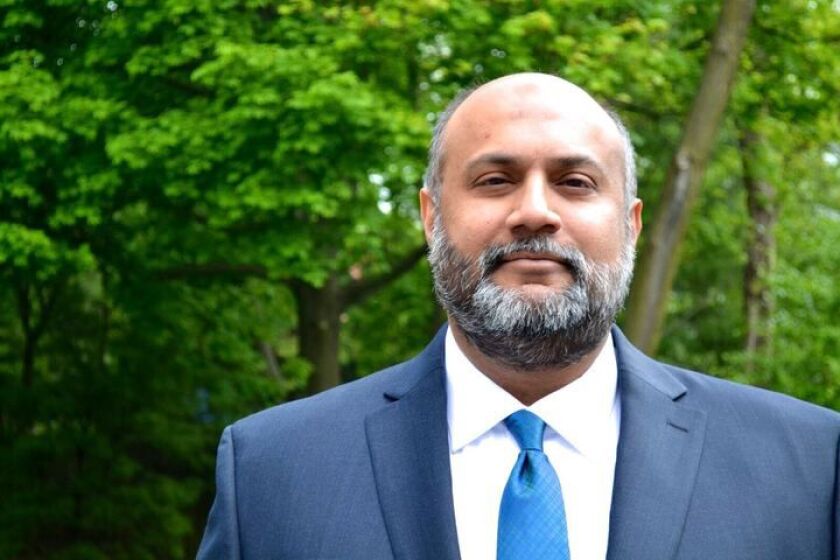A Palestinian University of Chicago finance student interned for a high-powered New York City hedge fund over the summer. His performance reviews were glowing, and he said he was all but promised a full-time job following his graduation later this year.
But the student never received an offer. When he asked why, he was told he showed “symbols” on social media with which the company didn’t want to be associated, he said.
He scoured his social media accounts, searching for anything that could have been taken the wrong way. Then he found it: a Palestinian flag in his Instagram bio, representing his heritage.
The student, who didn’t want to be named or identify the firm out of fear of reprisals, was heartbroken.
“It pains me,” he said. “I wish we didn’t live in a world where we look at your Instagram bio and see a flag and decide that means something.”
Now the student is searching for a post-grad position, and his experience at the hedge fund remains in the back of his mind when filling out applications, especially in the midst of rising outcries and hate crimes against Palestinians, Muslims and Arabs.
The student joins other Chicago-area college students and recent graduates whose support for Palestinian rights has had real-life repercussions, from lost jobs to being targeted by anti-Palestinian websites.
In interviews with the Chicago Sun-Times, the students and recent graduates described having to make agonizing decisions about whether protesting for what they believe is right could have an impact on their future careers or even their safety. Some say that in the wake of the Israel-Hamas war they are now hiding their backgrounds in interviews and have been hesitant to talk about their heritage.
The University of Chicago student said he’s since removed the Palestinian flag and a Syrian flag from his social media accounts and replaced them with a watermelon emoji, a more discreet symbol of Palestinian solidarity.
He also altered his approach to searching for a job, after he interviewed at a company in Chicago where multiple candidates were taken to lunch in November. When he told people he was Palestinian, the room went silent. An employee made a comment about “terrorism” in the Middle East and avoided him the rest of the day, he said.
After that interaction, he shied away from discussing his background in a job interview in Houston. When asked why he took Arabic language classes, he said it was because of its importance in regions where the oil industry thrives. In reality, he says he took Arabic because he wanted to better connect with his own culture.
“It’s hard to prove racism,” he said. “But in these cases it seems like the skew is there.”
Jinan Chehade, 25, of Bridgeview, was offered an associate position at Foley & Lardner in July and was set to begin last fall following her graduation from Georgetown University Law Center, according to a letter she shared with the Sun-Times. She accepted, rented an apartment near the office and planned her life around the offer.
As Chehade was preparing for her first day in October, she was called in for a meeting with the firm’s partners.
They asked her questions about her background, her social media posts and her work with Students for Justice in Palestine, a group that advocates for Palestinian rights that she co-founded at DePaul and Georgetown.
The firm rescinded the offer, saying she had made public statements about the Hamas attack on Israel that violated its values, and Chehade was out of a job.
“I was devastated by the loss,” said Chehade, who is Lebanese American. “The hopes and dreams I had, it felt like everything I worked for was turned to ashes.”
In a statement, the firm said it wouldn’t tolerate “anti-Semitism, Islamophobia, and acts of hatred towards Israelis and Palestinians.”
The statement said “prior to what would have been Ms. Chehade’s start date in October, the firm learned that she had made public statements about the horrendous attacks by Hamas on October 7 that were inconsistent with our Core Values.”
The firm did not detail the statements it was referencing, but Chehade has been heavily involved in activism for Palestinian rights throughout her undergraduate and law school career. Since October, she has posted and reposted footage of protests and bombings in Gaza on the social media platform X. Chehade said the firm didn’t reference a specific social media post or comment when it rescinded her offer.
“The financial burden and just the emotional burden, I’ve been trying to take it day by day, and with everything going on in Gaza, it was a heavy burden,” Chehade said.
Activists under a ‘microscope’
The professional pitfalls surrounding world events isn’t new to many Arab and Muslim students, said Omer Mozaffar, a lecturer of Islamic studies and Muslim chaplain at Loyola University Chicago, but it’s still disconcerting.
Protesting comes with risks, said Mozaffar, who highlights the “microscope” placed on them when he advises students.
“The sad reality is that long before this began, my annual routine with my Palestinian students is to caution them about their activism … because there are forces that are trying to destroy them,” including by posting information online about their activities.
“It is, for them, a real threat.”
Some websites have compiled “dossiers” about Palestinian supporters, including details on their activism that includes photos, videos, social media handles and LinkedIn pages, among other information.
Canary Mission, a site that claims it “documents people and groups that promote hatred of the USA, Israel and Jews,” has targeted more than 1,000 people, including more than 30 students in Illinois, including Chehade. Campus Watch, a site that says it “reviews and critiques Middle East studies in North America with the aim to improve them,” has singled out Mozaffar and other professors.
While the sites say they are warning employers and others of people who might have dangerous views, many of those targeted are involved in nonviolent protests and simply support the Palestinian cause, Mozaffar said.
“The depiction of people is often to show that they are hostile or they are threats to greater society or just the civic population,” Mozaffar said, adding the sites often twist statements or post them without context.
Canary Mission did not respond to a request for comment.
Mike Miccioli, a 24-year-old physics graduate student at the University of Chicago, said he had received threatening social media messages since information about him was posted on Canary Mission after he protested universities’ ties to Israel. His dossier on Canary Mission lays out his campus organizing and documents Miccioli’s anti-Israel protests and quotes in the Harvard University student newspaper.
While he is not Palestinian and says the hate mail is probably an empty threat, he believes sites like Canary Mission are especially dangerous to Palestinians if their photos and other identifying information are posted.
Some students have since been barred from visiting the West Bank by the Israeli government or strip-searched at the Tel Aviv airport, Mozaffar said.
The U of C finance student said the potential he could be targeted online for his beliefs “makes me feel very unsafe.” The fact that he and other students have already lost out on jobs is troubling.
“A world in which people only work for people who agree with them is a very polarized world,” he said.







